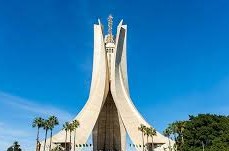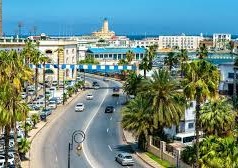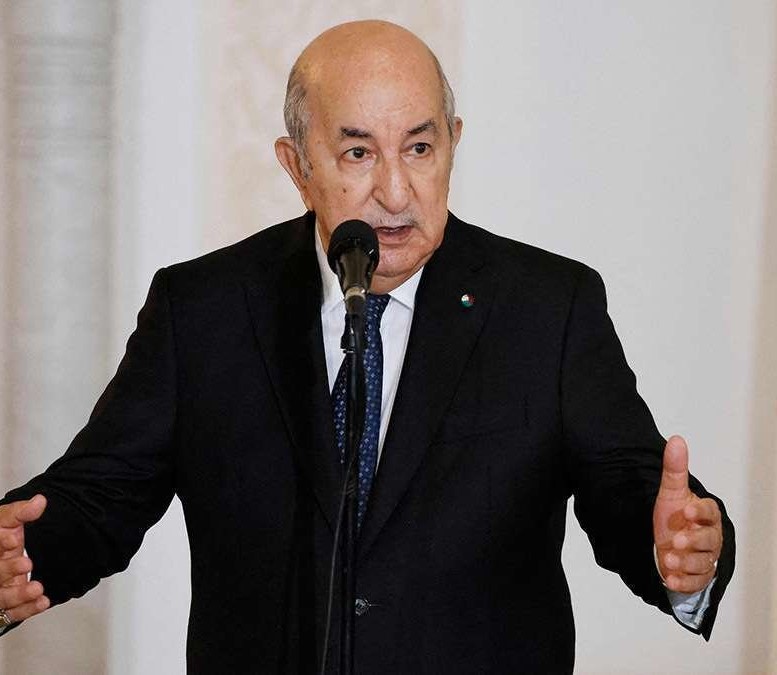Algerian President Mr. Abdelmadjid Tebboune won the elections held on September 7 for a second term, with 84.30% which confirms his popularity among the Algerian people, after the great successes he achieved at the political, economic and diplomatic levels.

By Tazeen Akhtar
Algeria is the largest country in Africa and the Arab and Mediterranean regions with an area estimated at 2,381,741 km2, it is in the middle of the world, linking North Africa to Europe across the Mediterranean.
Algeria, with its important strategic location, significant economic potential, and natural wealth, and its strong political ties with African countries, represents a solid base to move towards the continent to promote partnership and trade exchange, especially as it is an active and influential country in the African Union and a member of the African Continental Free Trade Area Agreement (AFCFTA). Algeria has a strong commitment to enhancing partnership and trade between African countries, and supporting South-South cooperation.
Algeria has rich material and human resources and a modern infrastructure, being ranked as the Fourth in Africa, after South Africa, Egypt and Nigeria, evidently with a gross national product of about 245 billion USD in 2023, that will be in 2024 the 3rd largest economy in Africa with a GDP of 267 billion USD according to IMF World Economic Outlook with a rate of growth 4.1%, Foreign Currency Reserves 69 billion USD, Exterior Debt less than 01 billion USD.
In the industrial sector, following the relaunch of the Algerian Agency for Investment Promotion (AAPI) in 2022, accompanied by full digitalization and a single-window system to ensure transparency, expedited registration, monitoring, and implementation processes, around 09 thousands of investment projects have been registered, with many already in operation. 
This has led to a significant increase in production across various sectors, exceeding domestic demand and enabling export. For example, production capacity of cement exceeds 50 million tons, with an export surplus of 18 million tons. The pharmaceutical industry has also advanced, now covering 75% of the country’s needs.
In the energy and mining sectors, Algeria has launched several major projects that are set to begin production soon, as the Ghar Djebilet iron mine in the south, one of the world’s largest reserves with 3.5 billion tons and annual production capacity of 40 to 50 million tons, and the integrated phosphate project in the east, with reserves of 2.8 billion tons and will produce 10 million tons annually. Additionally, Algeria is expanding its exploitation of lithium, zinc, and lead mines.
Algerian energy group Sonatrach, the biggest in Africa is actively expanding its oil and gas explorations and establishing new petrochemical factories. At the African level, Algeria is the first in gas production (137 billion m3 annually) the tenth in the world, reserve (4.5 trillion m3), in few years it will arrive to produce 200 billion m3.
The third in oil production (1 million barrels per day) and in reserves (12 billion barrels). It also has great mining wealth, the largest iron mines such as Gara Djebilat – Tindouf, with reserves of 3.5 billion tons, with a production capacity of 40 to 50 million tons of iron Crude, and among the world’s largest reserves of phosphate (2.8 billion tons) with a production capacity of 10 million tons per year.
In addition to gold, zinc, copper, marble, nickel, lithium and other energies which are renewable as the sun shines more than 3000 hours annually. It also produces more than 40 million tons of cement, with an export capacity of 18 million tons.
Algeria is an energy country par excellence, where energy prices are competitive and very low, which provides comfort for citizens, reduces the cost of production and encourages investment; natural gas: 0.21 to 0.40, Euros/electricity: 0.1 to 0.4 euros/hundred kilowatts/hour, gasoline: 0.30 euros/liter, Diesel: 0.17 euros/liter.
Algeria also has a road network, the second in Africa, with more than 140,000 km, and a railway network that will cover the entire national territory and link it with the neighboring countries of the Maghreb and the southern borders. It will reach 6,300 km soon and 12,500 km in 2030.
– Vast geography of fruitful agriculture:
Agriculture: Algeria’s land is fertile for all types of agriculture; in the north/the coast, the center/the plateaus, the south/the oases and the Sahara desert, full of various agricultural products, with 35 billion dollars, which covers 75% of the national needs, as well as 1,600 km of beaches on the Mediterranean, being rich in marine resources.
A vast and varied charming geography, a climate with four seasons in one day, beautiful beaches on the Mediterranean, a mountain range in the north and south, wide steppes, beautiful oases and a great desert. In light of the favorable investment climate and activating production mechanisms, diversifying sources of wealth, Algeria has initiated large-scale projects, with reforms of hundreds of thousands of agricultural lands, particularly in desert areas, As a result, agricultural production meets 75% of the country’s needs, while wheat production covers 80%. Algeria is expected to achieve self-sufficiency in 2025.
-Modern Infrastructure, Regional and Continental Integration Policy:
Infrastructure across various sectors was developed: transport, education, healthcare, railways, and water resources. The country now has 36 airports, 11 seaports, 63 universities, and 50 higher education institutes, with a combined capacity to train 1.7 million students, 200,000 of whom graduate annually. The total number of hospitals and specialized medical centers is about 3213 facilities. The pharmaceutical industry has also advanced, by achieving 75% self-sufficiency.
In efforts to secure water resources, Algeria has focused on expanding its desalination capacity. By the end of 2024, the country will have 19 seawater desalination plants producing 3.7 million M3 of water per day, covering 42% of Algerian people needs. By 2030, the target is to increase this capacity to 5.6 M3per day, meeting over 50% of the needs.
-Algeria, beautiful touristic destination:
Vast and various geography with different weathers, An attractive tourist destination with all kinds of beach, mountain and desert tourism, Byzantine, Phoenician, Roman, Christian, Islamic, Ottoman and modern archaeological sites. There are seven sites classified as UNESCO World Heritage: the Kasbah of Algiers, the Roman ruins of Djemila (district of Setif /east), the M’zab Valley region (the south center), Timgad (near Batna, the capital of the Aures region, / the east), Bani Hammad Castle (east, since the year 1007, the era of the Hammadid state) Tassili region (Tamanrasset – the farthest desert) is the largest natural museum in the world.


